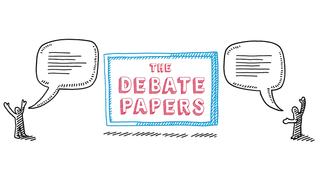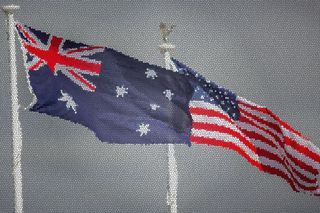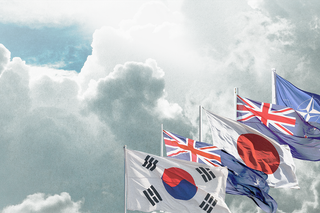In its 2023 public opinion survey, the United States Studies Centre found almost two-thirds of Australian, American and Japanese respondents agree that their countries should support developing democracies in Asia to hold democratic elections. Nevertheless, the extent to which democratic values should play a role, whether active or passive, in guiding Australia’s foreign policy remains a live topic of discussion.
To discuss the future direction of Australia’s engagement with its region, the Centre invited a debate between two experts. Responding to the question ‘should democracy have a greater role in Australia’s foreign policy’, Bridi Rice, CEO of the Development Intelligence Lab was asked to argue the affirmative and for the negative case, Nick Bisley, Dean of Humanities and Social Sciences and Professor of International Relations at La Trobe University.
Democracy should absolutely have a greater role in Australian foreign policy, but not in the values driven way the United States might expect
Bridi Rice is an international development expert and is currently the CEO of the Development Intelligence Lab.
Democracy should absolutely have a greater role in Australian foreign policy. It is entirely predictable that as geostrategic competition and instability loom close to Australian borders, Canberra is talking more about democracy — just not in the language that the United States understands, or expects us to be speaking.
Why? Because the United States’ out and proud brand of democracy promotion will not deliver the foreign policy outcomes Australia seeks. To state the obvious: Australia is not the United States. Not in geography, not in global status, and not in foreign policy DNA.
For the past few years, Australian policymakers and those advising them have been picking a careful path through the democracy promotion minefield. No one is blind to the fact that nationalism, populism, political polarisation and identity politics are challenging institutions in democracies worldwide. Democratic rule is far from being a given globally. What is more, the overlay of geostrategic competition brings into sharp focus a potential clash of systems between liberal democracy and autocracy.
The overlay of geostrategic competition brings into sharp focus a potential clash of systems between liberal democracy and autocracy.
President Biden argues that democracy must prove itself, reasoning that this will be key to competing with China and Russia. However, in Australia, many development and foreign policy leaders warn against making liberal values the primary frame of engagement in the Indo-Pacific, because it risks alienating more partners than it does drawing them closer. They argue that Australia can support principles like pluralism, tolerance and accountability without being explicitly in the democracy promotion game. They call on Australia to respect its bilateral partners when they say they do not want to be lectured or told to sign up to a set of Western liberal norms and institutions that do not look like their own.
This is all well and good. Sophisticated and sensible. But this same argument has also been used to excuse Australia’s partial retreat from serious efforts to support governance, human rights, civil society, free media and access to justice in the Indo-Pacific. Critics point to Australia turning a blind eye on issues central to state effectiveness and human security in the region — be it gender equality and violence in Papua New Guinea, corruption in the Pacific, election integrity, or hesitancy to work with civil society through Australia’s aid program. A combination of factors is at work: the gravitational pull for the Australian Government to keep the region’s ruling elites on side, development budget cuts and local environments that are less welcoming of external interventions, especially in Southeast Asia.
But as Foreign Minister Wong forecasts a ‘decisive’ decade, and names ‘effective and accountable states’ (rather than ‘democracies’) as one of four key focuses of Australia’s new International Development Policy, there is now a compelling need for Australia to rethink its approach. The way forward is:
Be clear about why democracy has a place in Australian foreign policy. Effective states look after themselves and the region. They are critical to Australia’s economy, its national security and the stability of the region as a whole. Australian efforts to support effective states are more about providing services to people, supporting healthy, actively engaged populations and enabling countries to act with autonomy and respect for sovereignty — less about a clash of systems or narrowly defined competition with China.
But Australia is not perfect. There is serious work to do for Australia to rebuild and modernise its governance credentials and to establish a clear-eyed and principled approach to providing governance support.
Be practical. The primary expression of Australia’s commitment to democracy abroad is through its development program’s governance efforts. This is the right way to go. Australia distinguishes itself in the region by being a helpful, practical donor that tackles challenges shoulder-to-shoulder with its bilateral partners. The country enjoys greater access and invitations to support local governance initiatives than many other donors, for example in parts of Southeast Asia where Australia works on issues of water access, public policy development and transnational crime. But Australia is not perfect. There is serious work to do for Australia to rebuild and modernise its governance credentials and to establish a clear-eyed and principled approach to providing governance support. This work is already underway and is something to watch closely as Australia translates its new International Development Policy into bilateral and regional support. A choice by Australia to just tackle the low-hanging governance fruit would be a strategic error and a disservice to its own democratic credentials.
Play a long game. The biggest challenge Australian foreign policy faces is how to balance the instinct to keep elite bilateral partners happy whilst not being missing in action on issues that are core to democracy and effective states. These include human rights violations, press freedom, corruption and pluralism. The answer lies in the Australian Government’s ability to be honest with itself. Australia can continue to tell itself that avoiding tough conversations or development program support that challenges authoritarian practices is simply good, sensible and respectful foreign policy — or it can start to think more broadly about the cost-benefit analysis of this work and gear its development program towards playing the long game.
Interests must drive Australian foreign policy
Nick Bisley is the Dean of Humanities and Social Sciences and Professor of International Relations at La Trobe University.
The promotion of democracy should not play too great a role in Australian foreign policy. It risks narrowing the range of partners that Australia can work with to advance its international interests, unnecessarily accentuates regional competition, and ultimately limits the effectiveness of Australia’s policy choices.
As great power rivalry returns to world politics, the temptation to see in US-China competition a repeat of the ideological contest of the Cold War is powerful. Once again, it appears, Washington must lead the democratic forces against autocratic illiberalism. While there are many good reasons to doubt the utility of the historical analogy, political leaders in the United States, Europe and parts of Asia have been swift to dust off the ideological rhetoric when framing their international policy. The Biden administration has led from the front, convening a ‘Summit for Democracy’ in its first year and has placed the competition between autocracy and democracy at the heart of its National Security Strategy. Australia was also notable for its enthusiasm for a values-laden framing of its foreign policy under former Prime Minister Scott Morrison.
Anthony Albanese’s Labor government has retained a surprising degree of continuity with the foreign policy of its Coalition predecessor. But the modulation of the rhetoric describing its approach has been a subtle but significant change, along with its efforts to defrost relations with China. This approach has some questioning whether democracy is now not the foreign policy priority it appeared to be under the Coalition.
With such high stakes, and given the importance of liberal democratic values to the nation’s success, it is understandable why some might argue that democracy should play a more important, indeed determining, role in Australia’s approach to the region. Yet to do so would be a critical error.
Undoubtedly, the region’s geopolitics are in a new phase. The four decades of peace and prosperity created by Sino-American rapprochement is over and a contest for the shape of the order to come has begun. Australia is a critical player in this competition, both in the sense that how it is resolved will be of fundamental importance to the country’s national well-being and because it is an active player in this game with a capacity to influence the contours of the emerging order. With such high stakes, and given the importance of liberal democratic values to the nation’s success, it is understandable why some might argue that democracy should play a more important, indeed determining, role in Australia’s approach to the region. Yet to do so would be a critical error.
By placing democracy, and values more broadly, either as a means or an end of its foreign policy, Australia risks narrowing the range of partners that it can work with to advance its international interests. While a more liberal and democratic region is clearly desirable, the most important interest it has in a time of geopolitical contest is to ensure a stable and favourable regional balance of power, and that an open and rules-based capitalist economic order is maintained. Given the democratic backsliding occurring across Asia in recent years, the number of possible democratic partners is shrinking almost by the day. To curtail China’s ambitions to transform the regional strategic balance, Australia will need to be able to participate in wide-ranging diplomatic coalition building and strategic policy cooperation with partners of widely varying political structures and values. Over-indexing on democracy in foreign policy will greatly limit the effectiveness of Australia’s policy choices and badly complicate its statecraft. For example, collaboration with Vietnam, a country with whom Canberra shares significant interests in the region’s strategic competition, is made problematic if not impossible if democracy promotion plays too great a role in its policy making.
The promotion of values, whether democratic or otherwise, is an especially challenging task in foreign policy because it tends to drive states to hard binary choices. One supports human rights or a free press or one does not. If Canberra places too great a weight on those values it means it can become politically problematic to align oneself with a country that is infringing those values. National interests demand a level of flexibility in political alignment and orientation which is hindered by an overly ideological approach. Indeed in times of acute risk, such as a crisis in the South China Sea, the compromises necessary to manage the situation become more difficult to achieve thus escalating the risks of the crises getting out of control.
The promotion of values, whether democratic or otherwise, is an especially challenging task in foreign policy because it tends to drive states to hard binary choices.
In the complex and multidimensional process of contemporary diplomacy, the risk of placing values at the centre is that it drives stark choices and reduces flexibility, precisely at a time when having freedom to manoeuvre is of the utmost importance. Given the erosion of core democratic principles such as the protection of minority rights and free expression in nations like India, for example, too strict an adherence to a values framework would drive Australia to shun such countries in formulating long-term strategies or responding to specific challenges.
Australia also needs to be cautious about the weight it gives to democracy and the advocacy of liberal values because of the ongoing legacy of colonialism. Most of the region and indeed many countries across the world have achieved their independence in less than a human lifetime. The language of democracy promotion and the universal appeal of liberalism can sound to many as yet more interference in the hard-won right to self-determination. Equally, when poorly executed, democratic advocacy and promotion can be condescending and, given Australia’s serial mistreatment of its Indigenous population and its less-than-exemplary adherence to liberal values at times, also opens up charges of hypocrisy. Humility and sensitivity are needed in this domain, both in public rhetoric, as well as with efforts to advance democratic ambitions. On that latter front working with Asian democracies, such as South Korea or Japan, might be one way to avoid the risks of condescension.
To be clear, Australia should not adopt a cold-blooded realpolitik and ignore all aspects of values and rights in its approach to the region. It is surely in Australia’s interest to have a more liberal world. However, given the nature of an international contest in which a genuine battle for hegemony is in the offing, Australia must be clear-eyed about its interests and make hard choices about its priorities and the trade-offs it is prepared to undertake. For only when the region’s balance of power is stable and favourable can Australia’s subsidiary interests in rules, norms and principles be secured in the longer run.










